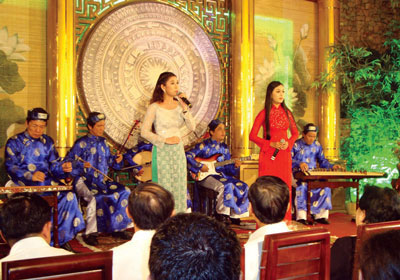The first national festival of “Don ca tai tu”, the musical art that UNESCO recognised as an intangible cultural heritage, will take place in the southern province of Bac Lieu from April 20-25.

The Bac Lieu People’s Committee said on January 7 that the opening ceremony is scheduled to be held at the Hung Vuong square, Bac Lieu city, on April 21 night.
There will be a composition competition on the art with the theme on Bac Lieu and the southern region and performances staged by amateur singers and instrumentalists across the country.
According to Nguyen Chi Thien, director of the provincial Department of Culture, Sports and Tourism, the festival will also feature an exhibition on folk musical instruments, a show of ancient motors and a photo contest themed “The land and people of Bac Lieu”.
Le Thi Ai Nam, Vice Chairman of the Bac Lieu People’s Committee and deputy head of the festival’s organising board, said the event will help promote the land and people of the southern region and Bac Lieu province, in particular, in a bid to lure more visitors and spur sustainable local socio-economic development.
The national “Don Ca Tai Tu” festival is scheduled to be held triennially in southern provinces in turn.
Known as a musical art that has both scholarly and folk roots, Don ca tai tu developed in southern Vietnam in the late 19th century. The impromptu art honours the creativeness and artistry of the performers.
UNESCO recognised the art as an intangible cultural heritage on December 5 during the 8th session of the Intergovernmental Committee for the Safeguarding of the Intangible Cultural Heritage in Baku, Azerbaijan.
The art is performed at numerous events, such as festivals, ‘death anniversary' rituals, and celebratory social events. The audience can join in, by practicing, making comments or creating new words for songs.
It has been transmitted from generation to generation through official and unofficial forms of education in all 21 provinces, where the art form is popular. Don ca tai tu has continually been popularised through cultural exchanges among peoples, presenting their mutual harmony and respect.
The art form is played on a variety of different instruments, including the kim (moon-shaped lute), co (two-stringed fiddle), tranh (16-string zither), ty ba (pear-shaped lute), song lang (percussion), bau (monochord) and sao (bamboo flute), and the violin and guitar, which were adapted.
The musicians who contribute to Don ca tai tu include master instrumentalists, master lyricists, master singers, instrumentalists, and singers.
Influenced by other forms of cultural heritage from the central and southern regions of Vietnam, such as nhac le (ceremonial music) and hat boi (classical theatre and folk song), the music genre was added to the National List of Intangible Cultural Heritage in 2012.